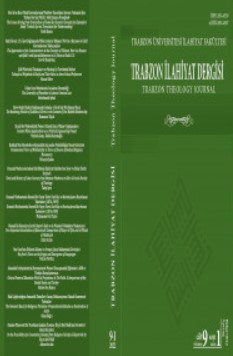İbn Cinnî’nin Dillerin Kökeni ve Ortaya Çıkışı Hakkındaki Görüşleri
Ibn Jinnī's Views on the Origin and Emergence of Languages
Author(s): Tahsin YURTTAŞSubject(s): Historical Linguistics, Philosophy of Middle Ages, Philosophy of Language, Rhetoric
Published by: Karadeniz Teknik Üniversites - İlahiyat Fakültesi
Keywords: Arabic Language and Rhetoric; Ibn Jinnī; Language; Origin; Inspiration;
Summary/Abstract: In this article, the theoretical views of Ibn Jinnī (d. 392/1002), a scholar of the Arabic language, on the origin and formation of languages are discussed. Ibn Jinnī is one of the first linguists to describe the emergence of language in a broad way in the history of Arabic linguistics. He expresses three basic theses about the origin of language, namely divine inspiration (tevqīfī), consensus and sounds; but he does not state any of these views as his final opinion. It is not true that some classical and contemporary linguists claim that he completely defends the consensus view. Ibn Jinnī prefers to abstain on this issue and finds each view true and powerful in its context. He finds the view that language should be taught to people by Allah, that is, inspired. Along with some verses and narrations on this subject, he is influenced by the views of the scholars of his time. However; because he says that this verse can be interpreted in the direction of the agreement view. Secondly, Ibn Cinnī gives examples of language being a work of consensus. According to him, the consensus view includes four stages: sensory, determination, signification and abstraction. The language definition made by Ibn Jinnī also confirms the conventionalism view. We think that he benefited from Fārābī's views on the emergence of language while justifying the conventionality of language. Thirdly, Ibn Jinnī conveys the view that the origin of language is the sounds heard and the words chosen from these sounds by imitation. In contemporary linguistics, new theories regarding the formation of language through 'consensus' or 'sound-reflection' can be based on Ibn Jinnī's views of 'consensus' and 'sound'.
Journal: Trabzon İlahiyat Dergisi
- Issue Year: 9/2022
- Issue No: 1
- Page Range: 332-355
- Page Count: 24
- Language: Turkish

